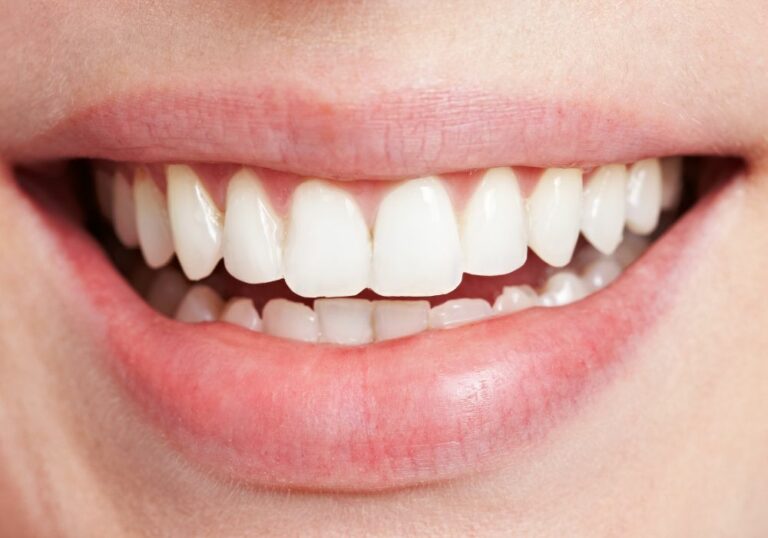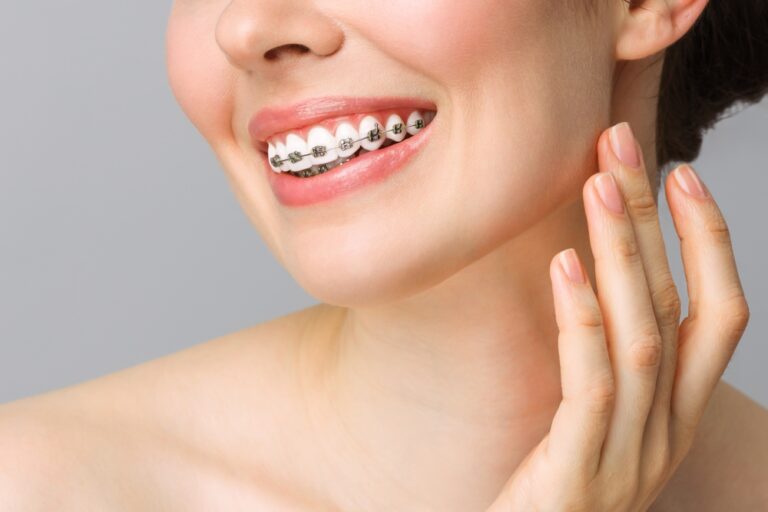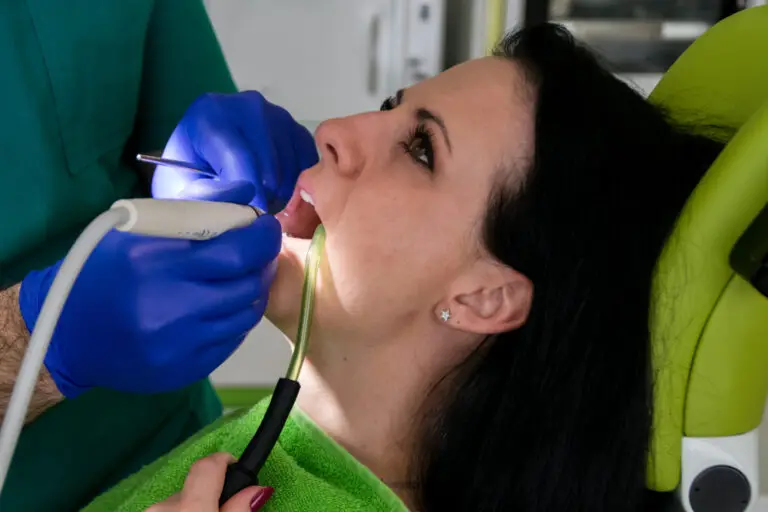If you’ve recently gotten braces, you may have noticed some popping or clicking sounds coming from your mouth when you eat or open wide. This can be alarming at first, but it’s actually very normal and nothing to worry about. Teeth popping with braces is caused by the wires and brackets rubbing against each other and your teeth as your teeth shift into their new positions. In this article, we’ll explain in much more detail why teeth pop with braces, when it should start to subside, tips to reduce it, and what to expect long-term.
What causes the popping sound?
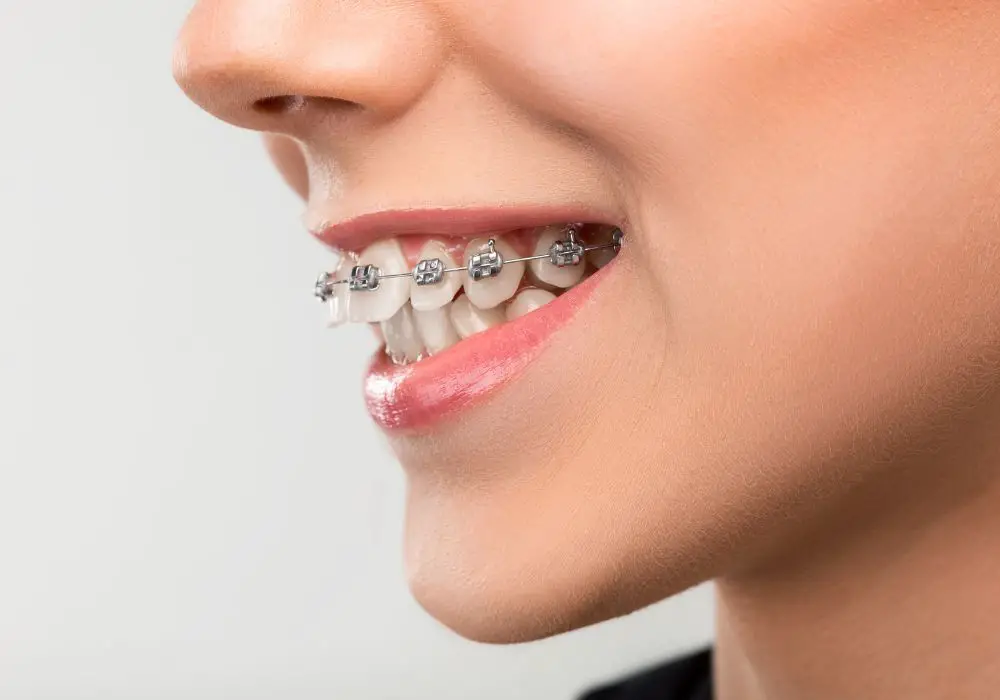
There are a few main causes of the popping or clicking sound you may hear with braces:
The archwire
The archwire is the main wire that runs horizontally across your braces and attaches to all of the brackets on your upper and lower teeth. It is held in place with elastic bands called ligatures or sometimes metal ties. The archwire is what applies pressure to move your teeth to their desired positions.
As your teeth start shifting in response to the archwire, the wire will bend and then pop back into place against the brackets as it releases force. This creates a clicking or popping noise. The larger the adjustments your orthodontist makes to your archwires (such as going up a wire size or changing the shape), the more noticeable the popping sounds will be following appointments as the new wire settles into place.
New archwires are often put on every 4-6 weeks during treatment, so you may hear an increase in popping noises for a few weeks after each new wire is placed as your teeth move into their new alignment. The sturdy metal alloy that archwires are composed of allows them to bend and pop instead of break under pressure.
Ligatures
Ligatures are the small elastic O-rings or metal ties that hold the archwire to the brackets bonded to your teeth. Ligatures are stretched tightly across the brackets to hold the archwire securely in place.
As orthodontic force is applied from the archwire, your teeth will shift incrementally. This movement can cause the ligatures to snap against the brackets as they are pushed to their limit before releasing, creating a popping sound.
When you get new, tighter ligatures at adjustment visits, the increased tension on the ligatures can increase the frequency of the popping sound as they are under greater pressure. However, this allows for controlled, effective tooth movement.
Shifting teeth and bones
As your teeth shift into new positions along the archwire, they will push against each other and rub against the edges of the brackets and wire. This friction between your natural teeth, the brackets, and archwire creates clicking and popping.
In addition, as your teeth move, your jaw joint and facial bones also shift very slightly to accommodate the changes in your bite and tooth position. This bone and joint movement contributes to the audible pops you’ll hear with braces.
New spacers or springs
During certain stages of orthodontic treatment, spacers may be placed between teeth to create room for movement. The spacers put pressure against the sides of your teeth, which can result in more noticeable popping and clicking in that area of your mouth as the teeth adjust to the spacer over the first few days.
Springs may also be added to the archwires to help move specific teeth into line. These springs press against the brackets on those teeth, which leads to increased friction and thus more popping. Adding spacers and springs equates to adding more force moving your teeth, so greater noise is expected.
When does the popping start and how long does it last?
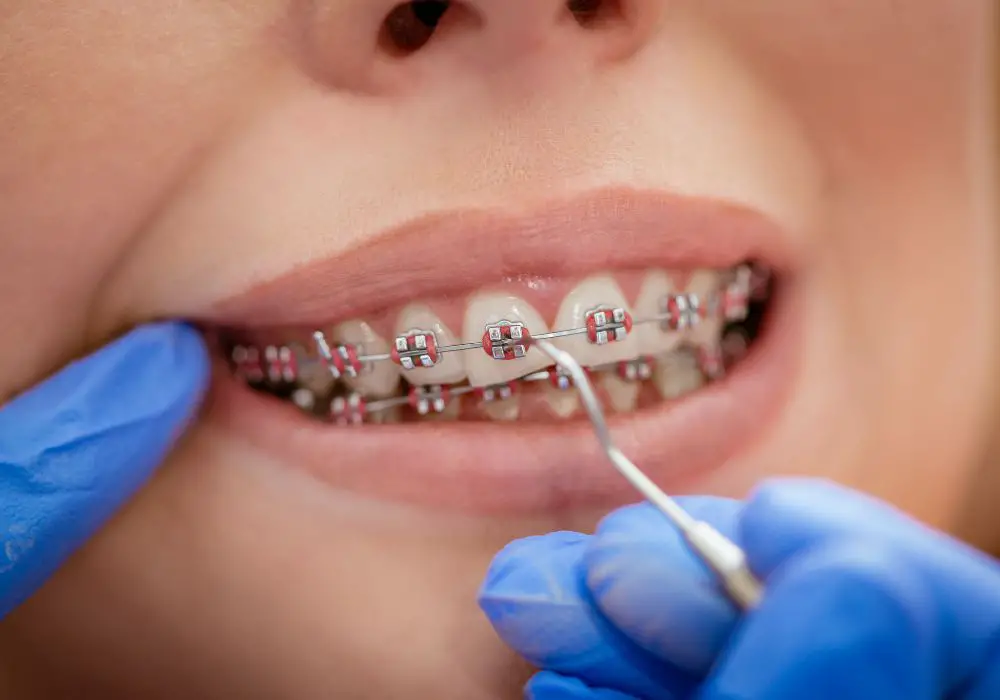
The popping and clicking associated with braces typically starts 2-7 days after your braces are first put on. It may slowly increase in frequency and volume over the first 1-2 weeks as your teeth begin reacting to the forces acting on them.
Many patients report the popping sounds are most frequent, loud, and noticeable in the first 2-4 weeks after an adjustment appointment when new wires, spacers or elastics have been placed. This is the time when the most dramatic tooth movement first occurs before settling in.
After this initial major moving phase, the popping sounds often decrease in their persistence and are less jarring. However, some clicking and popping may come and go throughout orthodontic treatment as adjustments are made to continue the teeth shifting process.
Here is a general timeline of what to expect with how long popping sounds may last with braces until they diminish:
- Days 1-3 after initial placement or adjustment: Slight popping or light clicking may begin. The sounds are usually subtle at this point.
- Days 4-7 after placement/adjustment: Moderate popping and clicking as your teeth start shifting. The sounds steadily increase in frequency and intensity. Difficult foods may cause discomfort.
- Weeks 1-2: Noticeable, frequent popping sounds as your teeth move into new alignment positions. The sounds peak during this time frame. Soreness is common.
- Weeks 3-4: Popping is still present but decreasing in regularity and prominence. Tooth movement is less rapid.
- After 1 month: Popping should be minimal or only occasional. Tooth movement stabilizes. Sounds are less jarring.
However, this is a general timeline and your individual timing may vary depending on your specific orthodontic plan and how rapidly your teeth move into place. If new wires, spacers or elastics are placed during follow-up visits, you may temporarily experience an increase in popping again for 1-2 weeks before it declines again. But it should not reach the same level as the initial placement.
Is popping with braces normal?
Yes, the popping and clicking noises associated with braces are very normal and are actually an expected sign that your teeth are actively moving properly. As your teeth shift in response to archwire and bracket forces, the various metal components of your braces will snap, click, and rub against each other from the pressure.
This audible mechanical movement of the braces is to be anticipated as your teeth track along into new positions. While the sounds may be annoying or take some getting used to, they indicate your orthodontic treatment is actively working and progressing as planned. Try not to be alarmed by the normal popping sounds.
If you are not experiencing searing pain along with the popping, there is nothing to worry about. Some minor discomfort is expected, especially when eating, but intense pain warrants contacting your orthodontist to determine the cause.
When should I be concerned about popping & see an orthodontist?
While standard levels of popping with braces are normal, there are certain situations where you may want to promptly consult your orthodontist:
- Persistent severe pain – If the popping is accompanied by moderate to severe pain that persists for several days and does not subside with over-the-counter pain relief, contact your orthodontist’s office. Lingering, radiating pain may signify an underlying issue that needs to be addressed or adjusted.
- Bleeding from the gums – Any notable bleeding from the gums when popping occurs could signify significant irritation or rubbing from a wire or bracket that needs correction. Minimal surface irritation is normal but deeper bleeding warrants a check-up.
- Popping beyond 4 weeks – If the popping and clicking persist at a high level beyond the initial 4 week settling period after braces are put on or adjusted, check with your orthodontist. After a month, tooth movement should stabilize and major popping subside.
- Sudden changes in symptoms – If the popping suddenly increases significantly in frequency or intensity compared to your baseline, it could signify a new problem developing that needs attention. Seek prompt advice from your orthodontist.
- Broken braces – Any broken wires, loose bands or cracked brackets that you notice that are causing popping should be addressed immediately. Schedule an appointment as soon as possible to have damaged braces repaired.
- Difficulty eating – If the amount of popping makes eating uncomfortable or challenging, consult your orthodontist for advice on ways to reduce the symptoms so you can eat normally. Difficulty eating may mean an adjustment is needed.
While noise, minor discomfort and potential gum irritation are expected as normal parts of orthodontic treatment, anything unusual or beyond regular popping should be examined and addressed by your orthodontist’s office without delay for your safety and treatment progress.
Tips to reduce teeth popping with braces
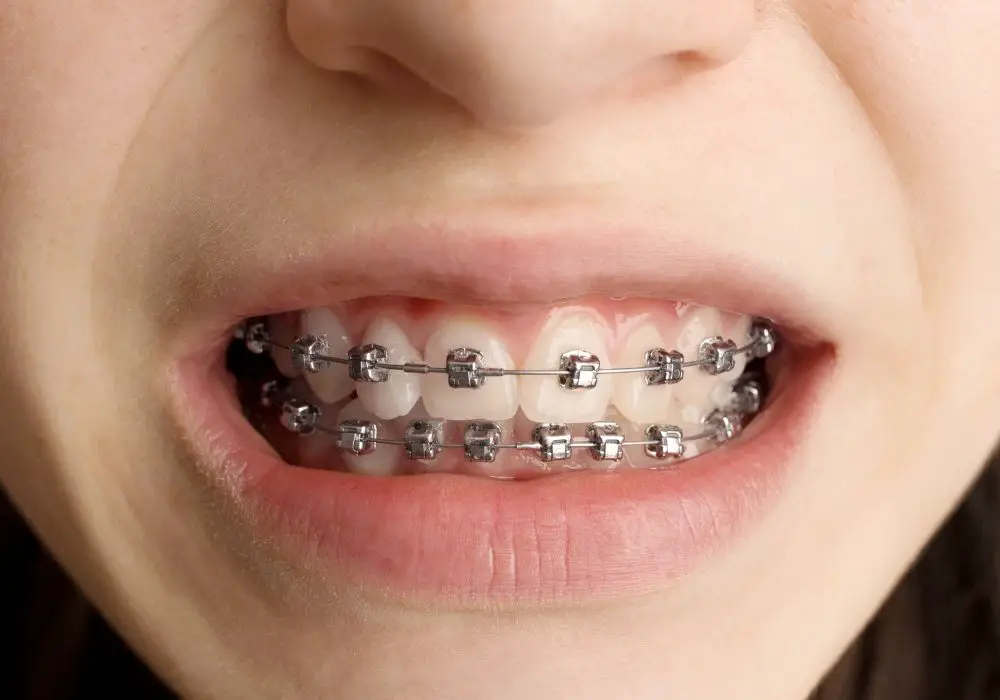
It will likely take some patience and getting used to all the new sounds and sensations of your teeth popping and shifting with braces. Here are some tips that can help minimize and manage the noise, discomfort and potential issues:
- Use orthodontic wax – Apply protective wax to any poking or protruding wires, ends of brackets or bands that may be rubbing and causing friction, clicking and discomfort. Smooth any rough edges.
- Avoid very hard, crunchy, sticky, chewy foods – Popping and related pain can be reduced by avoiding foods that could pull on or get stuck in braces like hard candies, ice cubes, nuts, seeds, raw carrots, bagels, dried fruit, taffy, gum, popcorn kernels, or beef jerky. Stick to softer foods.
- Take over-the-counter pain medication – Anti-inflammatory pain relievers like ibuprofen or acetaminophen can help relieve soreness and discomfort associated with the increased popping and pressure during initial tooth movement. Use as directed.
- Rinse mouth with warm salt water – Gently swish and rinse your mouth with a warm salt water solution to help soothe irritation, inflammation, and minor gum bleeding caused by new braces. Do this several times a day.
- Bite on a clean cotton roll – Placing a cotton roll between your upper and lower back teeth and gently biting down can help pop your jaw joint into place and reduce some popping sounds. Do this periodically as needed.
- Schedule prompt follow-up appointments – Getting wires, rubber bands and other components checked and adjusted quickly if something breaks can help reduce lengthy, severe popping and complications. Keep scheduled adjustments.
- Use orthodontic wax – Applying wax to protruding components that may be rubbing and poking can reduce friction irritation. Reapply as needed.
- Avoid chewing hard items like ice, pens, fingernails or sunflower seeds that could damage braces and make popping worse.
When to expect the popping to end
The popping and clicking associated with your braces should start to noticeably decrease in frequency and intensity around 4 weeks after initially getting braces placed and after each adjustment appointment.
After 2-3 months, popping should occur only intermittently with occasional adjustments vs. regularly. Once your teeth have successfully shifted into their final proper positions and are stabilized in retainers, the popping and clicking should stop completely.
However, this general timeframe can vary greatly depending on your unique orthodontic treatment plan, amount of tooth movement needed, and pace of your tooth movement. Discuss your individual estimated treatment schedule with your orthodontist so you know what to realistically expect.
With good oral hygiene, wearing elastics as directed, avoiding hard foods, and following your orthodontist’s instructions, the annoying popping sounds should resolve on schedule as your teeth settle into place. If not, promptly consult your orthodontist to determine if mid-course corrections are needed.
Summary
Hearing your teeth pop frequently with braces can be concerning initially but is very normal and will improve with time. The sounds are caused primarily by the archwires and ligatures pressing on the affixed brackets as your teeth shift.
Popping and clicking is most prominent in the first 1-2 months after getting braces on or adjusted before declining. It may come and go to a lesser degree during subsequent adjustments. While irksome, this noise signals that your orthodontic treatment is actively moving your teeth into improved alignment.
Focus on keeping your braces clean to avoid complications that could prolong treatment. With patience and following your orthodontist’s recommendations, the popping will resolve once your bite is corrected. Promptly contact your orthodontist with any questions or concerns beyond normal popping and soreness so they can evaluate and keep your treatment on track.
Frequently Asked Questions
Why does my jaw pop and feel stiff with braces?
The added force on your teeth from braces can cause your jaw joint and muscles to feel stiff and pop more from the change in pressure. This should stabilize over time as your bite alignment improves. Let your orthodontist know if it persists.
Can chewing more aggressively help reduce the popping sound?
No, chewing aggressively or forcefully is not recommended with braces as it can damage the wires and brackets. Stick to soft foods cut into small pieces and chew gently without crunching or popping sounds.
Is taking NSAID painkillers daily ok for the soreness from braces popping?
Taking an NSAID like ibuprofen daily is generally not recommended long-term while undergoing orthodontic treatment unless advised by your doctor. Use sparingly per directions for temporary relief of severe popping discomfort.
Why might my gums bleed when the braces pop even though I brush well?
Metal braces components can sometimes irritate gum tissue as your teeth shift, causing sensitivity and minor bleeding. Gently brushing and rinsing with warm salt water should help harden the gums. Report any persistent bleeding or sores to your orthodontist.
Is it ok if my braces are still popping a lot after 2 months?
Frequent loud popping after 2 months is not typical or ideal. Something may need adjustment or repair if popping remains prominent. Consult your orthodontist promptly so they can evaluate and get your treatment progress back on track.

